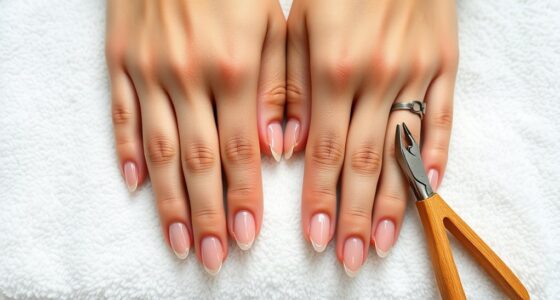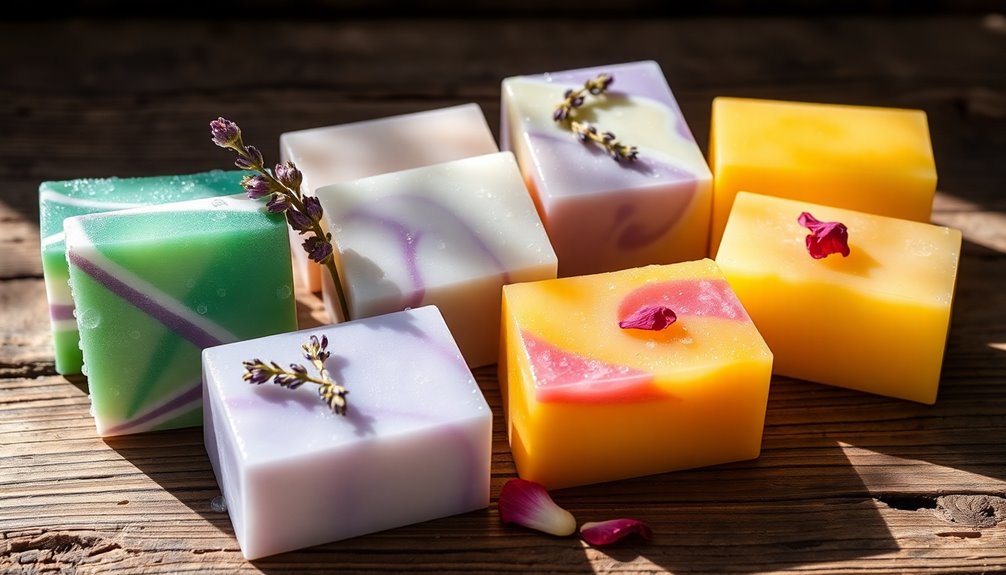Kering has sold its beauty division to L’Oréal for approximately USD 4.7 billion, marking a strategic move to focus more on its core fashion and leather goods businesses. This sale includes high-end brands like Creed and grants L’Oréal long-term licenses for luxury brands such as Gucci and Balenciaga. The deal helps Kering reduce debt and realign its focus, while L’Oréal enhances its position in the high-end beauty market. If you want to learn more about the deal’s impact, keep going.
Key Takeaways
- Kering sold its beauty division to L’Oréal for approximately €4 billion, equivalent to about USD 4.7 billion.
- The deal includes high-end fragrance brand Creed, acquired by Kering for €3.5 billion in 2023.
- This divestment allows Kering to focus on its core fashion and leather goods segments while reducing debt.
- L’Oréal’s acquisition enhances its luxury beauty portfolio with licenses for brands like Gucci and Bottega Veneta.
- The transaction reflects a strategic industry shift toward core competencies and long-term brand collaborations.

Kering is selling its beauty division to L’Oréal for approximately €4 billion, marking the luxury giant’s largest acquisition to date. This move signals a major shift in Kering’s strategic focus, shifting away from beauty to concentrate on its core strengths in fashion and leather goods, particularly flagship brands like Gucci. The sale includes high-end fragrance brand Creed, which Kering only acquired in 2023 for €3.5 billion. By transferring these assets, Kering aims to reduce debt and streamline operations, especially given its reported net debt of €9.5 billion as of mid-2025. The company’s beauty division has been disappointing, recording a €60 million operating loss in the first half of 2025, which has added to the pressure to divest and reallocate resources. Earlier efforts to diversify into beauty proved costly amid a slowdown in the luxury market, prompting Kering’s leadership, under new CEO Luca de Meo, to refocus on its profitable fashion and leather sectors. This divestment aligns with Kering’s strategic restructuring efforts.
Additionally, Kering’s decision reflects a trend among luxury brands to concentrate on core competencies rather than diversifying into less lucrative areas. For L’Oréal, this acquisition represents a significant strategic gain. It solidifies the company’s leadership position in luxury beauty by adding Creed’s heritage and craftsmanship to its portfolio. The deal grants L’Oréal 50-year exclusive licenses to develop beauty and fragrance products for Gucci, Bottega Veneta, and Balenciaga, giving the company long-term control over these high-profile brands. These licenses will only activate after current contracts, such as Gucci’s license with Coty, expire in 2028, ensuring a smooth transition. The partnership allows L’Oréal to deepen its presence in niche, high-margin fragrance markets and leverage Creed’s prestige to innovate and expand its luxury product offerings. Additionally, the deal includes joint ventures focused on wellness innovation, combining L’Oréal’s scientific expertise with Kering’s luxury reach. This positions L’Oréal to better compete in the high-end beauty segment amid growing consumer demand for prestige products.
Financially, the €4 billion sale injects much-needed liquidity into Kering, helping it cut debts and fund its core fashion investments. It also underscores a broader industry trend where companies focus on their core competencies instead of diversification into less profitable segments. For L’Oréal, acquiring an established luxury fragrance portfolio enhances its market share and revenue potential in the high-end beauty sector. The long-term licensing agreements reflect a commitment to sustained collaboration, enabling L’Oréal to innovate and distribute in the luxury space for decades. In an environment challenged by economic headwinds in markets like China and increased tariffs, these strategic moves highlight how major players adapt by reshuffling portfolios to maintain growth and competitiveness in the evolving global luxury landscape.
Frequently Asked Questions
How Will This Deal Impact Kering’s Overall Business Strategy?
This deal shifts your focus toward strengthening Kering’s core fashion brands like Gucci and Saint Laurent, enabling you to optimize resources and reduce debt. You’ll benefit from improved financial stability and liquidity, allowing you to invest more confidently in your luxury fashion segment. Additionally, partnering with L’Oréal opens new growth avenues in beauty and wellness, aligning with your strategic goal of maintaining a competitive edge in the luxury market.
What Are L’Oréal’s Plans for Integrated Brand Management Post-Acquisition?
You should see L’Oréal’s plans for integrated brand management as a strategic move to unify its luxury portfolio, leveraging centralized oversight to boost innovation and efficiency. They’ll actively manage product development, marketing, and distribution, ensuring brand consistency while preserving each brand’s unique heritage. This integration aims to accelerate growth, expand market reach, especially in high-growth regions, and harness consumer insights across brands, maximizing long-term value and competitive advantage.
How Will This Acquisition Affect Competition in the Beauty Industry?
This acquisition will likely reduce competition in the high-end beauty market because L’Oréal now controls more iconic luxury brands, making it harder for smaller rivals to compete. You’ll see increased market concentration, which could lead to higher prices and fewer options for consumers. However, it might also drive innovation and global reach, benefiting you with more advanced products and wider availability, but it could limit diversity in premium beauty choices.
Are There Any Antitrust Concerns With This Transaction?
Yes, there could be antitrust concerns with this transaction. L’Oréal’s increased market share in luxury beauty might raise questions about market dominance and reduced competition. Regulators could scrutinize whether the deal limits choices for consumers or stifles smaller competitors. While no public concerns have emerged yet, you should watch for potential regulatory reviews, especially regarding market concentration and fair competition in the global beauty industry.
What Are the Future Growth Prospects for the Acquired Brands?
You can expect promising growth prospects for the acquired brands as they tap into expanding markets and evolving consumer preferences. While traditional markets may slow, emerging regions like Asia-Pacific and Latin America offer substantial opportunities. Digital channels and e-commerce boost sales, and innovation in skincare and haircare keeps products relevant. Partnering with L’Oréal’s extensive resources, you’ll see these brands accelerate their global reach and adapt to trends like sustainable beauty and personalized experiences.
Conclusion
So, you can imagine, with Kering selling off their beauty empire to L’Oréal for a staggering $4.7 billion, the beauty world is about to get flipped upside down! This deal is so massive, it’s practically rewriting the rules of the game. Brace yourself, because this move could spark a beauty revolution that’ll have everyone talking for years to come. It’s not just a deal—it’s a beauty blockbuster waiting to explode!










